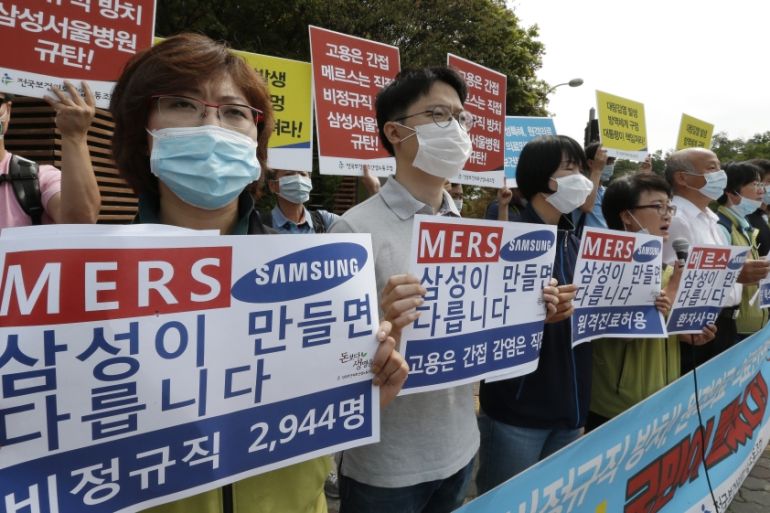Two Seoul hospitals suspend services over MERS outbreak
Hospital regarded as epicentre of the MERS virus outbreak closes ‘indefinitely’ as second facility stops admissions.

Two major hospitals in South Korea’s capital have suspended services to patients in a bid to stop the spread of Middle Eastern Respiratory Syndrome (MERS) after four new cases of the virus were reported.
Samsung Medical Center, where nearly 90 patients, visitors and medical staff have contracted the virus, declared a 10-day suspension of most services on June 14 to stem the spread of the virus.
Keep reading
list of 4 itemsS Korea says it is ‘virtually free’ of MERS
Second MERS case confirmed in the Philippines
S Korea to jail people defying MERS quarantine measures
But as the number of new infections has continued to grow, authorities have decided to extend the partial shutdown “indefinitely”, AFP news agency has reported.
The outbreak at the hospital, which belongs to South Korea’s top conglomerate Samsung group, prompted the group’s chief Jay Y Lee to publicly apologise for “causing great pain and concern” on Tuesday.
Another major Seoul hospital, Konkuk University Medical Center, on Wednesday also stopped admitting new patients and performing surgery after four cases were reported in recent days.
South Korean health workers had protested last week against the Samsung hospital’s inability to control the spread of the virus.
|
|
179 cases confirmed
The new cases of MERS included two who were in the same hospital ward as other patients with the potentially deadly virus, Seoul’s health ministry said.
The others were a nurse at Samsung, and a relative of a patient who was hospitalised for an unspecified disease in a hospital in Pyeongtaek, south of Seoul, in early June.
Out of 179 people now confirmed to have caught MERS, only five were infected through unknown transmission routes outside hospitals, the ministry said.
A total of 27 people have died in South Korea’s MERS outbreak – the largest outside Saudi Arabia – while about 3,100 people were still being held under quarantine at state facilities or at home on Wednesday.
Almost all infections so far have taken place in hospitals and the World Health Organization said it had found no evidence suggesting transmission of the virus outside of hospitals.
Infographic: The spread of MERS
Sixteen patients were in critical condition as of Wednesday, the ministry said, while 67 people have recovered and been released from hospital.
South Korea’s MERS outbreak began on May 20 when a 68-year-old man was diagnosed after returning from a trip to Saudi Arabia.
The virus since then has spread at an unusually rapid pace, sparking alarm in the Asia’s fourth-largest economy and elsewhere in the region.
The outbreak dealt a severe blow to businesses from tourism to retail as people have shunned crowded venues and more than 120,000 foreigners cancelled planned trips to Seoul.
South Korea’s central bank also cut its key interest rate this month in a bid to counter the economic impact of the outbreak, but its chief on Wednesday said it was already starting to fade.
“The extent of the fall has declined from the first and second week of the outbreak, which is why we are hoping the impact is weakening,” he said in comments carried by the Yonhap news agency.
There is no known vaccine for MERS, which has infected more than 1,330 people – mostly in Saudi Arabia – in 26 countries since first reported in 2012, according to the WHO.
WHO spokesperson Dr Margaret Harris told Al Jazeera on Wednesday that South Korean health officials were making “strong efforts to improve safety and trace the source of the virus”.
“Overall, the number of new cases of MERS in South Korea has been considerably reduced,” Harris said.